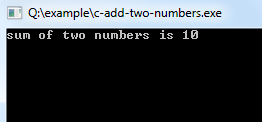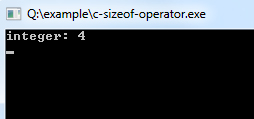C operators are symbols that are used to perform mathematical or logical manipulations. C programming language is rich with built-in operators. Operators take part in a program for manipulating data and variables and form a part of the mathematical or logical expressions.
Types of Operators in C
Arithmetic Operators
Arithmetic Operators are used for performing mathematical calculations like addition (+), subtraction (-), multiplication (*), division (/), and modulus (%).
| Operator | Description |
|---|---|
+
| Addition |
-
| Subtraction |
*
| Multiplication |
/
| Division |
%
| Modulus |
C Program to Add Two Numbers
Example:
#include <stdio.h>
void main()
{
int i=3,j=7,k; /* Variables Defining and Assign values */
k=i+j;
printf("sum of two numbers is %d\n", k);
}
Program Output:

Increment and Decrement Operators
Increment and Decrement Operators are useful operators generally used to minimize the calculation, i.e. ++x and x++ means x=x+1 or -x and x--means x=x-1. But there is a slight difference between ++ or -- written before or after the operand. Applying the pre-increment first adds one to the operand, and then the result is assigned to the variable on the left, whereas post-increment first assigns the value to the variable on the left and then increments the operand.
| Operator | Description |
|---|---|
++
| Increment |
−−
| Decrement |
C Program Demonstrate Prefix and Postfix Modes
#include <stdio.h>
//stdio.h is a header file used for input.output purpose.
void main()
{
//set a and b both equal to 5.
int a=5, b=5;
//Print them and decrementing each time.
//Use postfix mode for a and prefix mode for b.
printf("\n%d %d",a--,--b);
printf("\n%d %d",a--,--b);
printf("\n%d %d",a--,--b);
printf("\n%d %d",a--,--b);
printf("\n%d %d",a--,--b);
}Program Output:
5 4 4 3 3 2 2 1 1 0
Relational Operators
Relational operators are used to compare two quantities or values.
| Operator | Description |
|---|---|
==
| Is equal to |
!=
| It is not equal to |
>
| Greater than |
<
| Less than |
>=
| Greater than or equal to |
<=
| Less than or equal to |
Logical Operators
C provides three logical operators when we test more than one condition to make decisions. These are: && (meaning logical AND), || (meaning logical OR) and ! (meaning logical NOT).
| Operator | Description |
|---|---|
&&
| And operator. It performs logical conjunction of two expressions. (if both expressions evaluate to True, the result is True. If either expression evaluates to False, the result is False)
|
||
| Or operator. It performs a logical disjunction on two expressions. (if either or both expressions evaluate to True, the result is True)
|
!
| Not operator. It performs logical negation on an expression. |
Bitwise Operators
C provides a special operator for bit operation between two variables.
| Operator | Description |
|---|---|
<<
| Binary Left Shift Operator |
>>
| Binary Right Shift Operator |
~
| Binary Ones Complement Operator |
&
| Binary AND Operator |
^
| Binary XOR Operator |
|
| Binary OR Operator |
Assignment Operators
Assignment operators are applied to assign the result of an expression to a variable. C has a collection of shorthand assignment operators.
| Operator | Description |
|---|---|
=
| Assign |
+=
| Increments then assign |
-=
| Decrements then assign |
*=
| Multiplies then assign |
/=
| Divides then assign |
%=
| Modulus then assign |
<<=
| Left shift and assign |
>>=
| Right shift and assign |
&=
| Bitwise AND assign |
^=
| Bitwise exclusive OR and assign |
|=
| Bitwise inclusive OR and assign |
Conditional Operator
C offers a ternary operator, which is the conditional operator (?: in combination), to construct conditional expressions.
| Operator | Description |
|---|---|
? :
| Conditional Expression |
Special Operators
C supports some special operators
| Operator | Description |
|---|---|
sizeof()
| Returns the size of a memory location. |
&
| Returns the address of a memory location. |
*
| Pointer to a variable. |
Program to Demonstrate the Use of sizeof() Operator
Example:
#include <stdio.h>
void main()
{
int i=10; // Variables Defining and Assign values
printf("integer: %d\n", sizeof(i));
}
Program Output:
